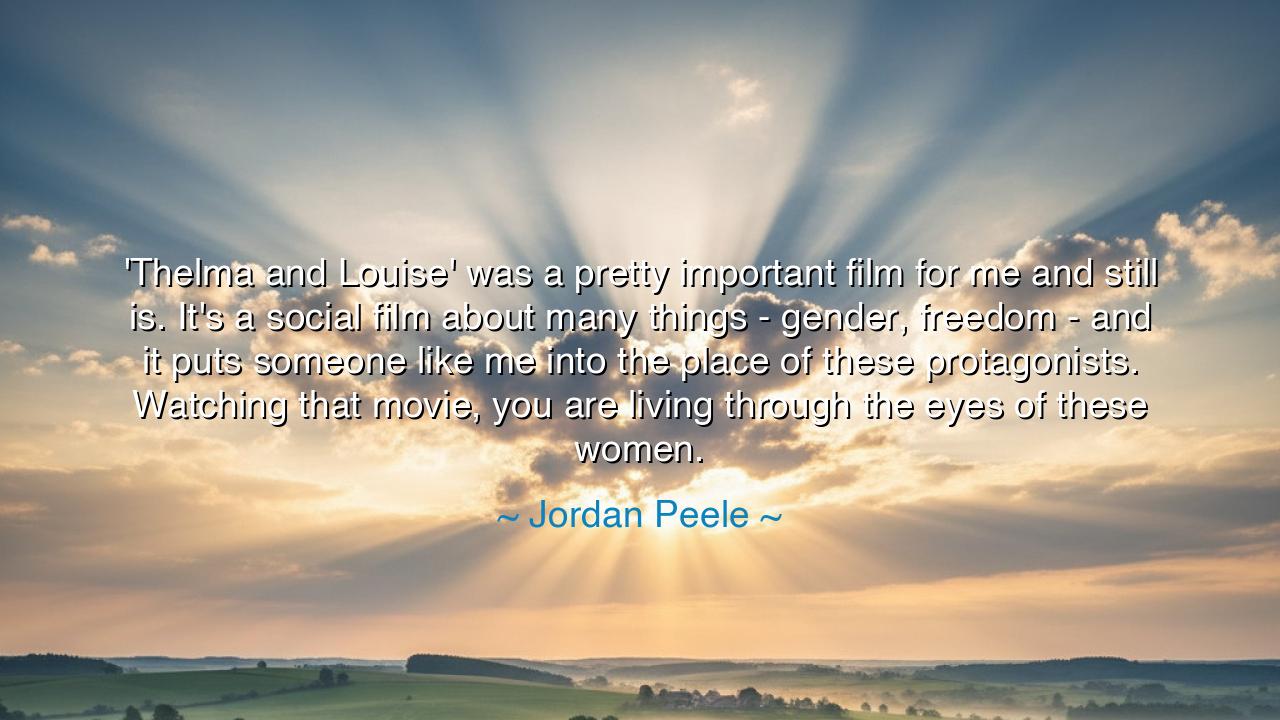
'Thelma and Louise' was a pretty important film for me and still
'Thelma and Louise' was a pretty important film for me and still is. It's a social film about many things - gender, freedom - and it puts someone like me into the place of these protagonists. Watching that movie, you are living through the eyes of these women.






Hear these words, O heirs of the screen, for Jordan Peele, teller of tales and conjurer of shadows, spoke of the film “Thelma and Louise.” He called it an important vision, a mirror of society, and a vessel through which one may live within the souls of women. He said: “It is a social film about many things—gender, freedom—and it puts someone like me into the place of these protagonists.” Thus he revealed the power of story: to dissolve the walls between self and other, and to awaken the spirit to truths beyond one’s own flesh.
For the tale of Thelma and Louise is no mere entertainment; it is a cry of rebellion, a hymn to the yearning for liberation. Two women, weary of chains both visible and unseen, take the road into the unknown. Their journey is one of resistance against the powers that belittle them, and of discovery of the strength they carried all along. In their final flight, soaring from the cliff into eternity, they transcended despair and became immortal symbols of freedom unbroken.
So too in the past have stories awakened empathy across the barriers of life. Recall the words of Harriet Beecher Stowe, whose book Uncle Tom’s Cabin stirred the conscience of a nation. Abraham Lincoln himself, upon meeting her, is said to have declared, “So you are the little woman who wrote the book that started this great war.” In her story, countless Americans—men, women, enslaved, and free—were forced to see the world through eyes not their own. This is the same sacred power that Peele discovered in the film: to walk in the path of another, and to feel their joy and sorrow as one’s own.
Therefore, let us honor the strength of gendered struggle, not as a burden to divide us, but as a flame that illuminates the common desire for dignity. To live through the eyes of these women is to recognize the chains that bind, and to desire their breaking, whether they weigh upon us directly or not. The story commands us to stand with the oppressed, for in their journey lies the truth of all humanity’s thirst for freedom.
Know this, O seekers: the true power of art is not in spectacle, but in its ability to pierce the heart. A film like Thelma and Louise does not end upon the credits, for it continues in the spirit of those who watch, urging them toward empathy, courage, and change. As Peele himself testifies, when the viewer becomes the protagonist, they inherit the struggle—and in that inheritance, they are transformed.






NHCao Ngoc Huy
I can totally understand why Jordan Peele holds 'Thelma and Louise' in such high regard. Films that tackle important social issues like gender and freedom have the ability to shift perspectives. I wonder, though, do we still have enough movies that put audiences in the shoes of marginalized groups? If a film like 'Thelma and Louise' were made today, would it have the same impact, or would it be seen as outdated?
AVPham Hoang Anh Vu
Jordan Peele’s take on 'Thelma and Louise' is really thought-provoking. It’s rare for a film to be so impactful, but it’s clear that this movie had a profound effect on him. I’m curious, though—does this movie still hold the same relevance today, or have we made progress in how we portray women’s freedom and agency in cinema? Or is it just that Peele’s personal connection to the film has shaped his perspective?
QTQuynh Tran
It’s so interesting that Jordan Peele connects so deeply with 'Thelma and Louise.' I can see how it would be a film that challenges traditional gender roles and provides a fresh perspective on freedom. But how much do movies like this really change how we think about those issues? Do they just entertain, or do they spark real change in how we see gender dynamics in society?
UGUser Google
I love how Jordan Peele reflects on 'Thelma and Louise.' It’s amazing how a movie like that can shape a person’s understanding of gender, freedom, and identity. The fact that he says it puts someone like him into the place of the protagonists is so powerful. It makes me wonder, though—how many films really manage to make people walk in the shoes of others? Is that what makes certain films timeless?